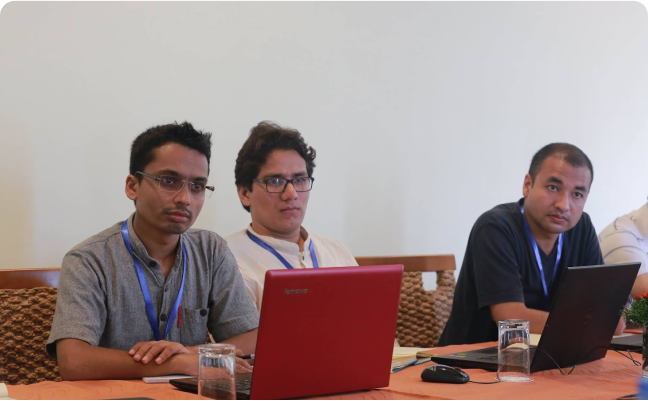
Organized series of workshops in collaboration with the British Embassy in Nepal working with journalist to strengthening their digital skills.

Organized series of workshops in collaboration with the British Embassy in Nepal working with journalist to strengthening their digital skills.
Digital journalism – latest trends and practices
Story Cycle and the British Embassy in Nepal working with journalist to strengthening Digital Journalists skills,Digital Journalism–latest trends and practices will take place in Nagarkot on August 17-18. We have already selected 10 participants for the workshop. We received an overwhelming number of applications for the workshops. We would like to thank all for their interest.Laura Oliver, a British trainer and former Guardian journalist, is arriving soon to share her insights. Apart from Laura, we have a line-up of experienced journalists including Mohan Mainali, Deepak Adhikari, Saurav Dhakal.We will update our sessions through Twitter and Facebook.
What was covered in the workshop:
– How to tell better stories for digital outlets. How to be productive as a news reporter. How to tailor your headlines and news story for digital outlets to increase your audience. The trainer will share experience from newsrooms of digital outlets.
– How to write for social media. How to promote stories on social media.
– How to handle user-generated content and verify the facts. How to verify news, photos, video and audio published on social media.
About Laura Oliver
Laura Oliver is a freelance journalist, digital consultant and trainer with a background in social media for newsrooms and working with audiences.She was previously head of social and communities at the Guardian (UK), where she led a team of journalists focused on sourcing, verifying and telling stories with social media, and building online communities around key topics, geographies and interests.Since becoming freelance she has trained journalists at the BBC and Financial Times, written for NPR, the Guardian and numerous specialist news websites.
About Mohan Mainali
Mohan Mainali is the editor of southasiacheck, Nepal’s only fact-checking initiative that has introduced the concept of fact-checking to Nepali journalism.Mainali has travelled extensively to remote corners of Nepal on reporting assignments. Such assignments form the basis of his features and investigative reports published in Nepali and international media, documentaries and books. His documentaries include: The Living of Jogimara, Puneko Pant and Timber to Tibet, among others.Mainali has two books to his credit. Upallo Thalo (2012) is a travelogue through which readers become familiar with the lives of people living in Nepal’s remote mountainous areas. His book Mantha Darayeko Jug (2015) is a journalist’s account of non-combatant victims of Nepal’s decade-long internal war.POKHARA: StoryCycle organized two half-day (one day in total) training sessions in Pokhara for local journalists on December 15-16, 2017. A total of 13 participants including two from outside Pokhara (Damauli and Gorkha) benefited from the workshop.

ocal trends such as lack of fact-checking, news reports without proper sourcing and a tendency to publish viral videos. The use of social media (especially Facebook) increased during the recently held parliamentary elections.After the presentation, our trainer Arpan Shrestha, a cross media producer who has worked for Al Jazeera English, The Guardian and Vice, ran a session on using smartphone for reporting. The hands-on training on basic photography, shooting and editing video by using a smartphone was useful for participants. Training also covered tools and apps required for digital storytelling.The second day’s half-day session covered search engine optimisation, map-based storytelling, developing a storytelling kit and best way to present and promote digital stories. Video recordings of sessions by Mohan Mainali, the editor of South Asia Check and British journalist Laura Oliver (formerly with The Guardian) were also presented to the participants and focused on fact-checking, verification and composing headlines for the new media.

The video session was followed by a hands-on sensitization activity by Shrestha, where participants were divided into popup newsrooms and were given a breaking news scenario but only had social media as their primary tool and disposal. The groups were assigned different scenarios where they had to quickly search and verify user-generated content, use social media and the internet to research and find sources, seek copyrights and abide by media ethics and privacy before they could break the news.

Finally, Saurav Dhakal, founder of StoryCycle, briefed the participants about Google Classroom, where we continue to mentor and support our participants.

Journalists outside Kathmandu rarely receive training on changing landscape of digital storytelling and how to best utilise the available tools. Under pressure to produce multiple copies, they don’t get chance to hone their skills or learn new skills. Our training strengthened their capacity. The takeaway for participants was that smartphone, if used properly, could be a useful tool in digital storytelling.
